SSC211e Social Science Research Methods Assignment Analysis
VerifiedAdded on 2022/10/06
|7
|1519
|16
Homework Assignment
AI Summary
This assignment delves into social science research methods, specifically examining the UPLIFT initiative in Singapore and the challenges faced by underprivileged children. The analysis begins by contrasting positivist social science (PSS) and interpretive social science (ISS) approaches, evaluating their suitability for studying social inequality and its impact on children's academic performance. The assignment then explores the ethical considerations within this research context, identifying potential malpractices such as lack of informed consent and falsification of information, and proposing mitigation strategies. The student argues for the use of interpretive social science to inform policy decisions aimed at addressing the root causes of inequality and improving educational outcomes. The assignment emphasizes the importance of research in formulating effective intervention strategies, highlighting the need for both preventive and remedial actions. The student adopts the role of the head of UPLIFT to analyze the problem and propose a plan for policy decision-making. The discussion underscores the significance of ethical practices and rigorous research methodologies in addressing complex social issues.
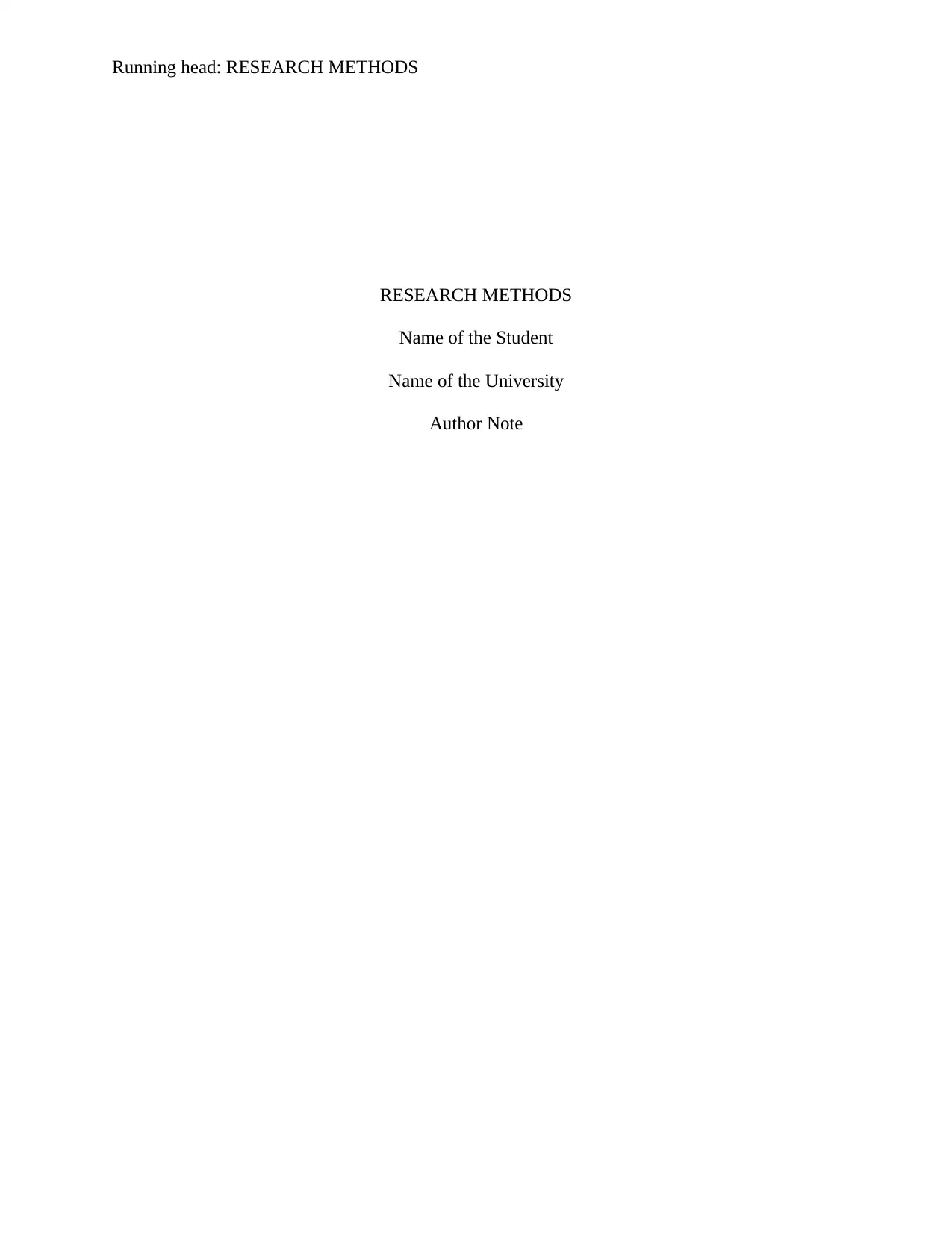
Running head: RESEARCH METHODS
RESEARCH METHODS
Name of the Student
Name of the University
Author Note
RESEARCH METHODS
Name of the Student
Name of the University
Author Note
Paraphrase This Document
Need a fresh take? Get an instant paraphrase of this document with our AI Paraphraser
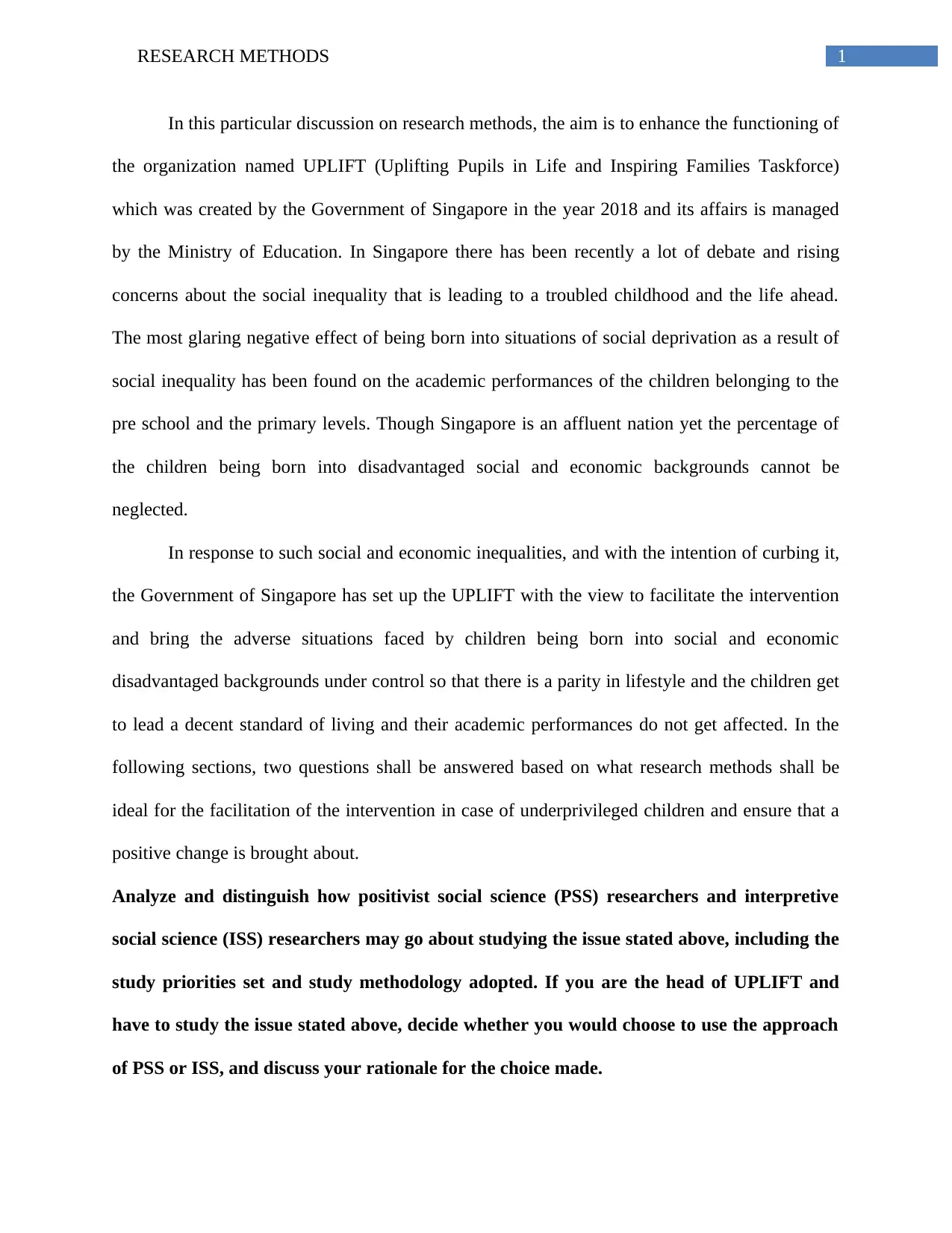
1RESEARCH METHODS
In this particular discussion on research methods, the aim is to enhance the functioning of
the organization named UPLIFT (Uplifting Pupils in Life and Inspiring Families Taskforce)
which was created by the Government of Singapore in the year 2018 and its affairs is managed
by the Ministry of Education. In Singapore there has been recently a lot of debate and rising
concerns about the social inequality that is leading to a troubled childhood and the life ahead.
The most glaring negative effect of being born into situations of social deprivation as a result of
social inequality has been found on the academic performances of the children belonging to the
pre school and the primary levels. Though Singapore is an affluent nation yet the percentage of
the children being born into disadvantaged social and economic backgrounds cannot be
neglected.
In response to such social and economic inequalities, and with the intention of curbing it,
the Government of Singapore has set up the UPLIFT with the view to facilitate the intervention
and bring the adverse situations faced by children being born into social and economic
disadvantaged backgrounds under control so that there is a parity in lifestyle and the children get
to lead a decent standard of living and their academic performances do not get affected. In the
following sections, two questions shall be answered based on what research methods shall be
ideal for the facilitation of the intervention in case of underprivileged children and ensure that a
positive change is brought about.
Analyze and distinguish how positivist social science (PSS) researchers and interpretive
social science (ISS) researchers may go about studying the issue stated above, including the
study priorities set and study methodology adopted. If you are the head of UPLIFT and
have to study the issue stated above, decide whether you would choose to use the approach
of PSS or ISS, and discuss your rationale for the choice made.
In this particular discussion on research methods, the aim is to enhance the functioning of
the organization named UPLIFT (Uplifting Pupils in Life and Inspiring Families Taskforce)
which was created by the Government of Singapore in the year 2018 and its affairs is managed
by the Ministry of Education. In Singapore there has been recently a lot of debate and rising
concerns about the social inequality that is leading to a troubled childhood and the life ahead.
The most glaring negative effect of being born into situations of social deprivation as a result of
social inequality has been found on the academic performances of the children belonging to the
pre school and the primary levels. Though Singapore is an affluent nation yet the percentage of
the children being born into disadvantaged social and economic backgrounds cannot be
neglected.
In response to such social and economic inequalities, and with the intention of curbing it,
the Government of Singapore has set up the UPLIFT with the view to facilitate the intervention
and bring the adverse situations faced by children being born into social and economic
disadvantaged backgrounds under control so that there is a parity in lifestyle and the children get
to lead a decent standard of living and their academic performances do not get affected. In the
following sections, two questions shall be answered based on what research methods shall be
ideal for the facilitation of the intervention in case of underprivileged children and ensure that a
positive change is brought about.
Analyze and distinguish how positivist social science (PSS) researchers and interpretive
social science (ISS) researchers may go about studying the issue stated above, including the
study priorities set and study methodology adopted. If you are the head of UPLIFT and
have to study the issue stated above, decide whether you would choose to use the approach
of PSS or ISS, and discuss your rationale for the choice made.
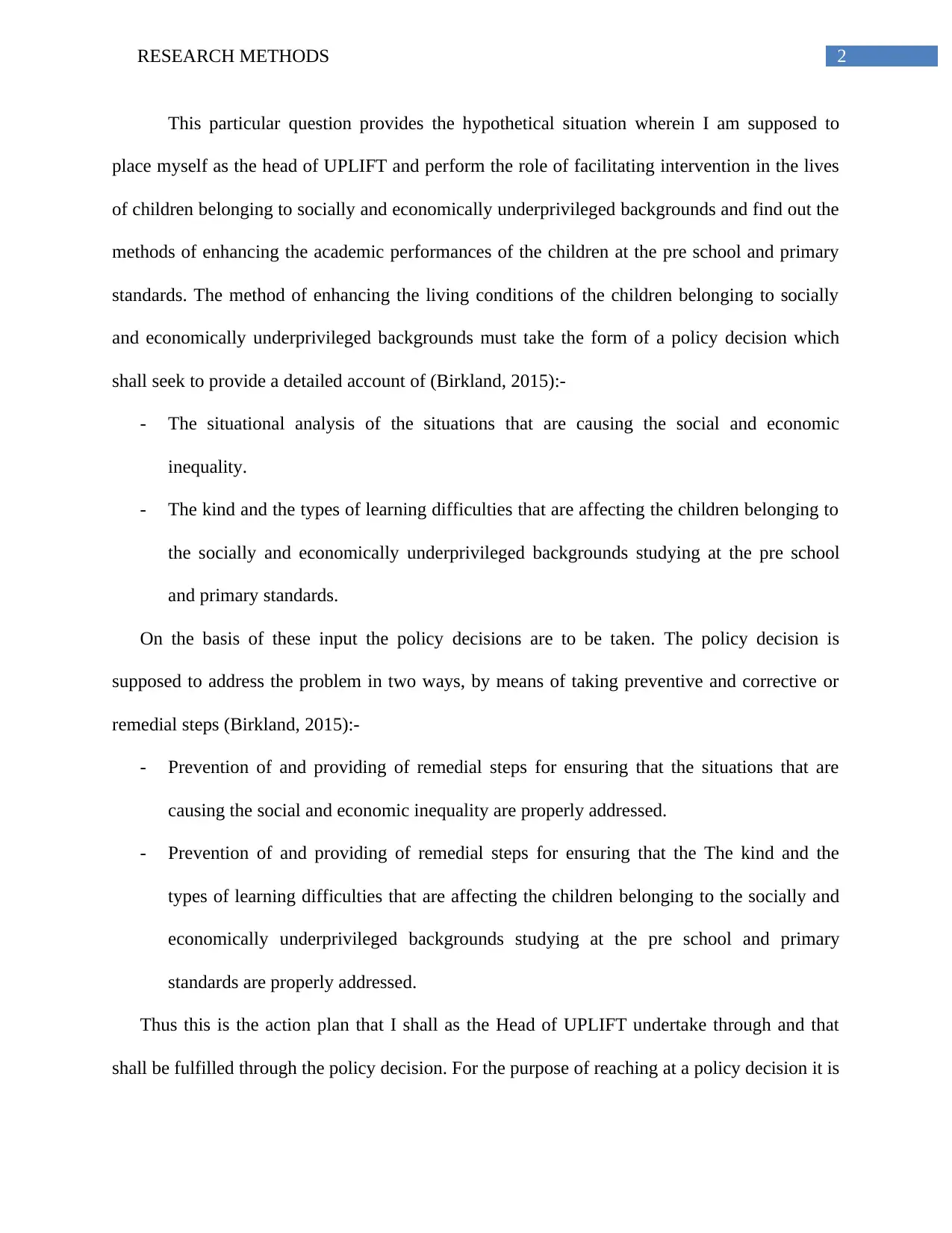
2RESEARCH METHODS
This particular question provides the hypothetical situation wherein I am supposed to
place myself as the head of UPLIFT and perform the role of facilitating intervention in the lives
of children belonging to socially and economically underprivileged backgrounds and find out the
methods of enhancing the academic performances of the children at the pre school and primary
standards. The method of enhancing the living conditions of the children belonging to socially
and economically underprivileged backgrounds must take the form of a policy decision which
shall seek to provide a detailed account of (Birkland, 2015):-
- The situational analysis of the situations that are causing the social and economic
inequality.
- The kind and the types of learning difficulties that are affecting the children belonging to
the socially and economically underprivileged backgrounds studying at the pre school
and primary standards.
On the basis of these input the policy decisions are to be taken. The policy decision is
supposed to address the problem in two ways, by means of taking preventive and corrective or
remedial steps (Birkland, 2015):-
- Prevention of and providing of remedial steps for ensuring that the situations that are
causing the social and economic inequality are properly addressed.
- Prevention of and providing of remedial steps for ensuring that the The kind and the
types of learning difficulties that are affecting the children belonging to the socially and
economically underprivileged backgrounds studying at the pre school and primary
standards are properly addressed.
Thus this is the action plan that I shall as the Head of UPLIFT undertake through and that
shall be fulfilled through the policy decision. For the purpose of reaching at a policy decision it is
This particular question provides the hypothetical situation wherein I am supposed to
place myself as the head of UPLIFT and perform the role of facilitating intervention in the lives
of children belonging to socially and economically underprivileged backgrounds and find out the
methods of enhancing the academic performances of the children at the pre school and primary
standards. The method of enhancing the living conditions of the children belonging to socially
and economically underprivileged backgrounds must take the form of a policy decision which
shall seek to provide a detailed account of (Birkland, 2015):-
- The situational analysis of the situations that are causing the social and economic
inequality.
- The kind and the types of learning difficulties that are affecting the children belonging to
the socially and economically underprivileged backgrounds studying at the pre school
and primary standards.
On the basis of these input the policy decisions are to be taken. The policy decision is
supposed to address the problem in two ways, by means of taking preventive and corrective or
remedial steps (Birkland, 2015):-
- Prevention of and providing of remedial steps for ensuring that the situations that are
causing the social and economic inequality are properly addressed.
- Prevention of and providing of remedial steps for ensuring that the The kind and the
types of learning difficulties that are affecting the children belonging to the socially and
economically underprivileged backgrounds studying at the pre school and primary
standards are properly addressed.
Thus this is the action plan that I shall as the Head of UPLIFT undertake through and that
shall be fulfilled through the policy decision. For the purpose of reaching at a policy decision it is
⊘ This is a preview!⊘
Do you want full access?
Subscribe today to unlock all pages.

Trusted by 1+ million students worldwide
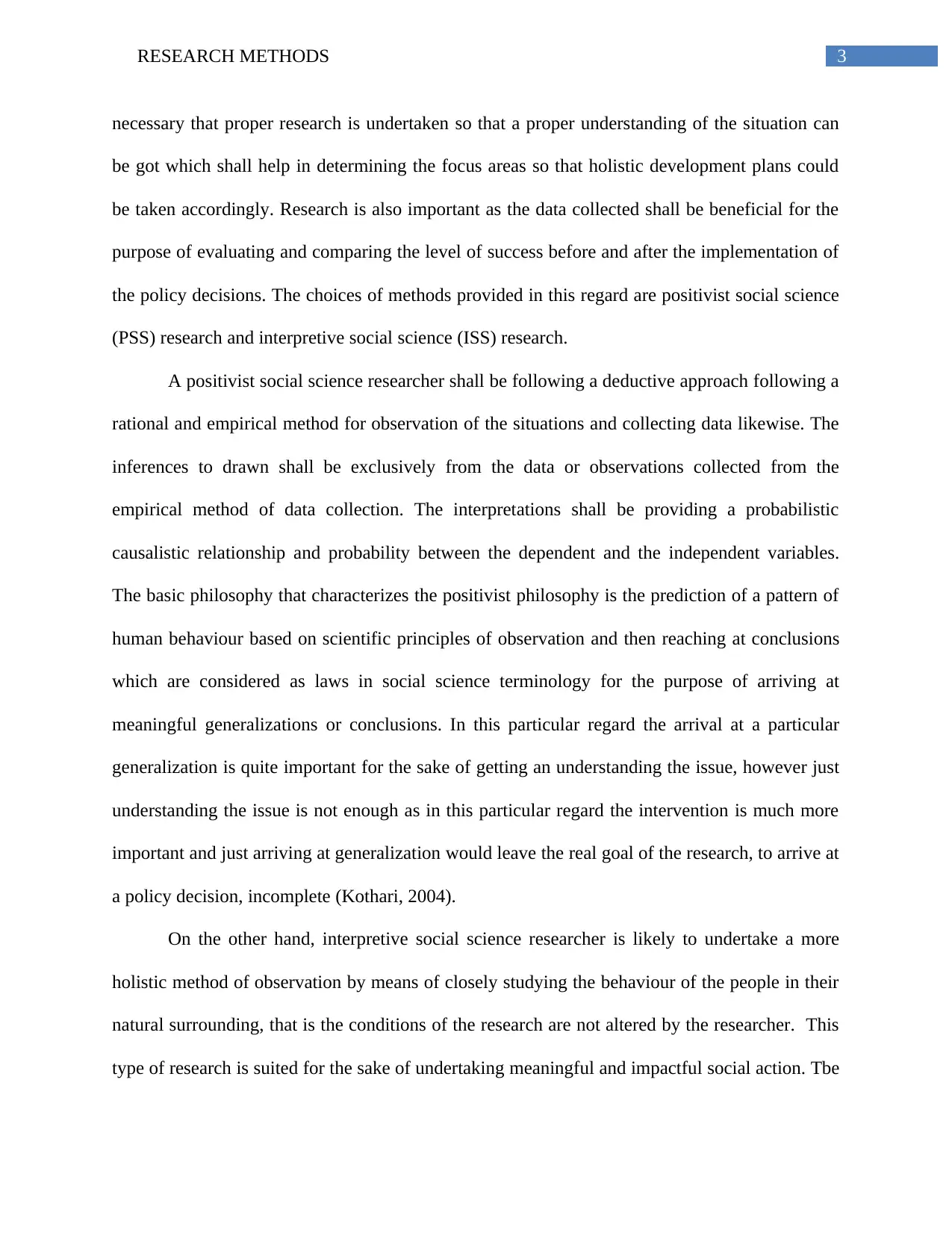
3RESEARCH METHODS
necessary that proper research is undertaken so that a proper understanding of the situation can
be got which shall help in determining the focus areas so that holistic development plans could
be taken accordingly. Research is also important as the data collected shall be beneficial for the
purpose of evaluating and comparing the level of success before and after the implementation of
the policy decisions. The choices of methods provided in this regard are positivist social science
(PSS) research and interpretive social science (ISS) research.
A positivist social science researcher shall be following a deductive approach following a
rational and empirical method for observation of the situations and collecting data likewise. The
inferences to drawn shall be exclusively from the data or observations collected from the
empirical method of data collection. The interpretations shall be providing a probabilistic
causalistic relationship and probability between the dependent and the independent variables.
The basic philosophy that characterizes the positivist philosophy is the prediction of a pattern of
human behaviour based on scientific principles of observation and then reaching at conclusions
which are considered as laws in social science terminology for the purpose of arriving at
meaningful generalizations or conclusions. In this particular regard the arrival at a particular
generalization is quite important for the sake of getting an understanding the issue, however just
understanding the issue is not enough as in this particular regard the intervention is much more
important and just arriving at generalization would leave the real goal of the research, to arrive at
a policy decision, incomplete (Kothari, 2004).
On the other hand, interpretive social science researcher is likely to undertake a more
holistic method of observation by means of closely studying the behaviour of the people in their
natural surrounding, that is the conditions of the research are not altered by the researcher. This
type of research is suited for the sake of undertaking meaningful and impactful social action. Tbe
necessary that proper research is undertaken so that a proper understanding of the situation can
be got which shall help in determining the focus areas so that holistic development plans could
be taken accordingly. Research is also important as the data collected shall be beneficial for the
purpose of evaluating and comparing the level of success before and after the implementation of
the policy decisions. The choices of methods provided in this regard are positivist social science
(PSS) research and interpretive social science (ISS) research.
A positivist social science researcher shall be following a deductive approach following a
rational and empirical method for observation of the situations and collecting data likewise. The
inferences to drawn shall be exclusively from the data or observations collected from the
empirical method of data collection. The interpretations shall be providing a probabilistic
causalistic relationship and probability between the dependent and the independent variables.
The basic philosophy that characterizes the positivist philosophy is the prediction of a pattern of
human behaviour based on scientific principles of observation and then reaching at conclusions
which are considered as laws in social science terminology for the purpose of arriving at
meaningful generalizations or conclusions. In this particular regard the arrival at a particular
generalization is quite important for the sake of getting an understanding the issue, however just
understanding the issue is not enough as in this particular regard the intervention is much more
important and just arriving at generalization would leave the real goal of the research, to arrive at
a policy decision, incomplete (Kothari, 2004).
On the other hand, interpretive social science researcher is likely to undertake a more
holistic method of observation by means of closely studying the behaviour of the people in their
natural surrounding, that is the conditions of the research are not altered by the researcher. This
type of research is suited for the sake of undertaking meaningful and impactful social action. Tbe
Paraphrase This Document
Need a fresh take? Get an instant paraphrase of this document with our AI Paraphraser
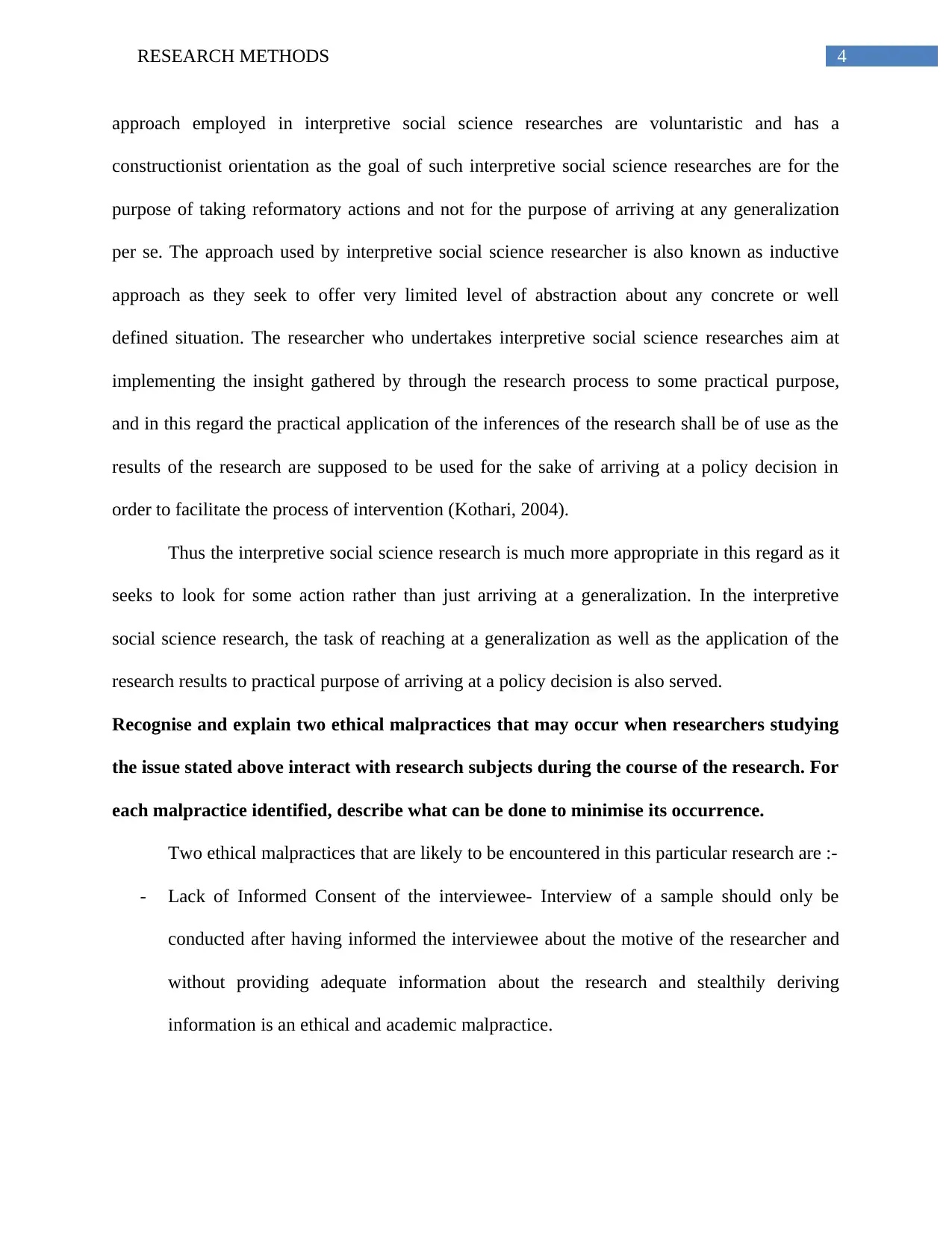
4RESEARCH METHODS
approach employed in interpretive social science researches are voluntaristic and has a
constructionist orientation as the goal of such interpretive social science researches are for the
purpose of taking reformatory actions and not for the purpose of arriving at any generalization
per se. The approach used by interpretive social science researcher is also known as inductive
approach as they seek to offer very limited level of abstraction about any concrete or well
defined situation. The researcher who undertakes interpretive social science researches aim at
implementing the insight gathered by through the research process to some practical purpose,
and in this regard the practical application of the inferences of the research shall be of use as the
results of the research are supposed to be used for the sake of arriving at a policy decision in
order to facilitate the process of intervention (Kothari, 2004).
Thus the interpretive social science research is much more appropriate in this regard as it
seeks to look for some action rather than just arriving at a generalization. In the interpretive
social science research, the task of reaching at a generalization as well as the application of the
research results to practical purpose of arriving at a policy decision is also served.
Recognise and explain two ethical malpractices that may occur when researchers studying
the issue stated above interact with research subjects during the course of the research. For
each malpractice identified, describe what can be done to minimise its occurrence.
Two ethical malpractices that are likely to be encountered in this particular research are :-
- Lack of Informed Consent of the interviewee- Interview of a sample should only be
conducted after having informed the interviewee about the motive of the researcher and
without providing adequate information about the research and stealthily deriving
information is an ethical and academic malpractice.
approach employed in interpretive social science researches are voluntaristic and has a
constructionist orientation as the goal of such interpretive social science researches are for the
purpose of taking reformatory actions and not for the purpose of arriving at any generalization
per se. The approach used by interpretive social science researcher is also known as inductive
approach as they seek to offer very limited level of abstraction about any concrete or well
defined situation. The researcher who undertakes interpretive social science researches aim at
implementing the insight gathered by through the research process to some practical purpose,
and in this regard the practical application of the inferences of the research shall be of use as the
results of the research are supposed to be used for the sake of arriving at a policy decision in
order to facilitate the process of intervention (Kothari, 2004).
Thus the interpretive social science research is much more appropriate in this regard as it
seeks to look for some action rather than just arriving at a generalization. In the interpretive
social science research, the task of reaching at a generalization as well as the application of the
research results to practical purpose of arriving at a policy decision is also served.
Recognise and explain two ethical malpractices that may occur when researchers studying
the issue stated above interact with research subjects during the course of the research. For
each malpractice identified, describe what can be done to minimise its occurrence.
Two ethical malpractices that are likely to be encountered in this particular research are :-
- Lack of Informed Consent of the interviewee- Interview of a sample should only be
conducted after having informed the interviewee about the motive of the researcher and
without providing adequate information about the research and stealthily deriving
information is an ethical and academic malpractice.
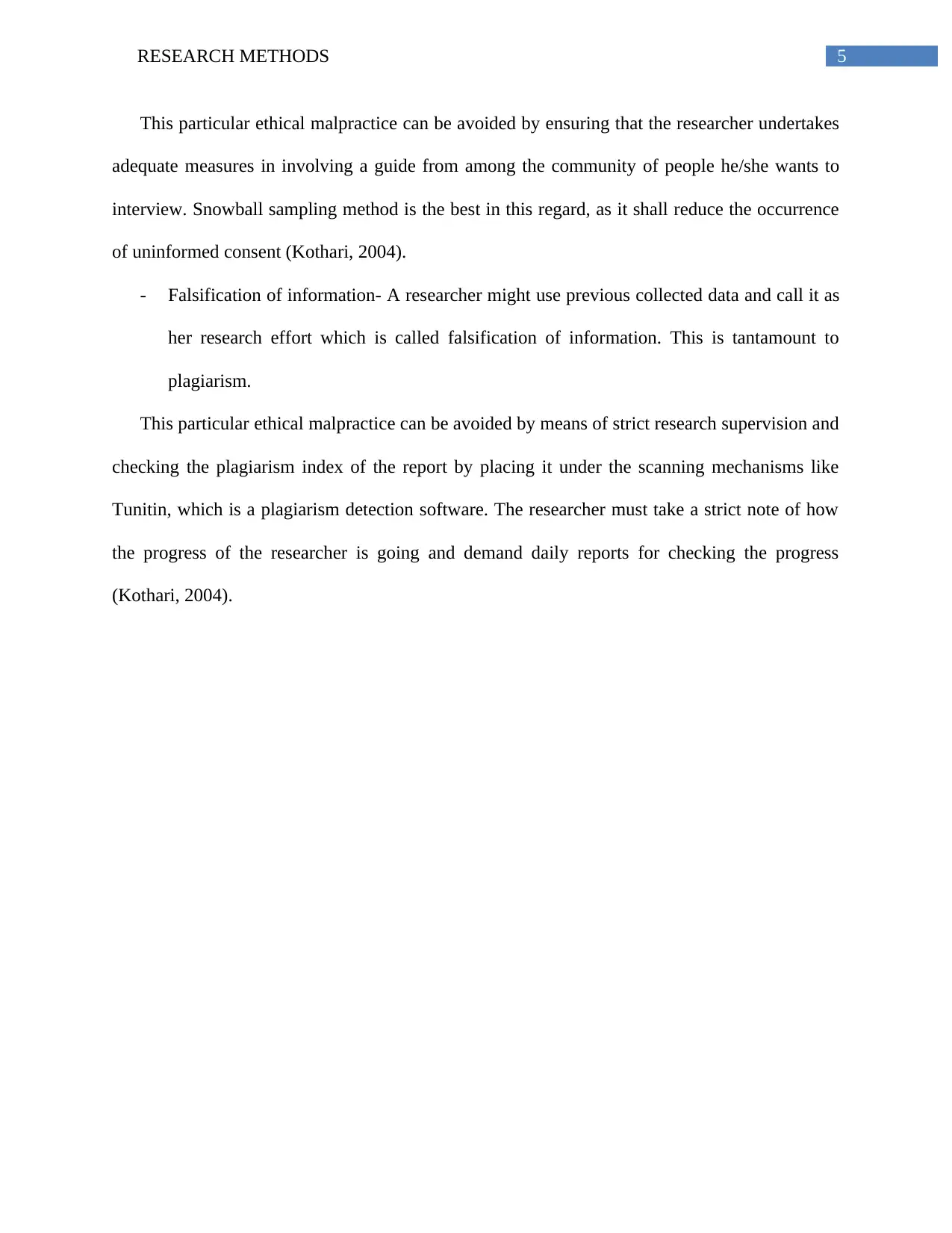
5RESEARCH METHODS
This particular ethical malpractice can be avoided by ensuring that the researcher undertakes
adequate measures in involving a guide from among the community of people he/she wants to
interview. Snowball sampling method is the best in this regard, as it shall reduce the occurrence
of uninformed consent (Kothari, 2004).
- Falsification of information- A researcher might use previous collected data and call it as
her research effort which is called falsification of information. This is tantamount to
plagiarism.
This particular ethical malpractice can be avoided by means of strict research supervision and
checking the plagiarism index of the report by placing it under the scanning mechanisms like
Tunitin, which is a plagiarism detection software. The researcher must take a strict note of how
the progress of the researcher is going and demand daily reports for checking the progress
(Kothari, 2004).
This particular ethical malpractice can be avoided by ensuring that the researcher undertakes
adequate measures in involving a guide from among the community of people he/she wants to
interview. Snowball sampling method is the best in this regard, as it shall reduce the occurrence
of uninformed consent (Kothari, 2004).
- Falsification of information- A researcher might use previous collected data and call it as
her research effort which is called falsification of information. This is tantamount to
plagiarism.
This particular ethical malpractice can be avoided by means of strict research supervision and
checking the plagiarism index of the report by placing it under the scanning mechanisms like
Tunitin, which is a plagiarism detection software. The researcher must take a strict note of how
the progress of the researcher is going and demand daily reports for checking the progress
(Kothari, 2004).
⊘ This is a preview!⊘
Do you want full access?
Subscribe today to unlock all pages.

Trusted by 1+ million students worldwide
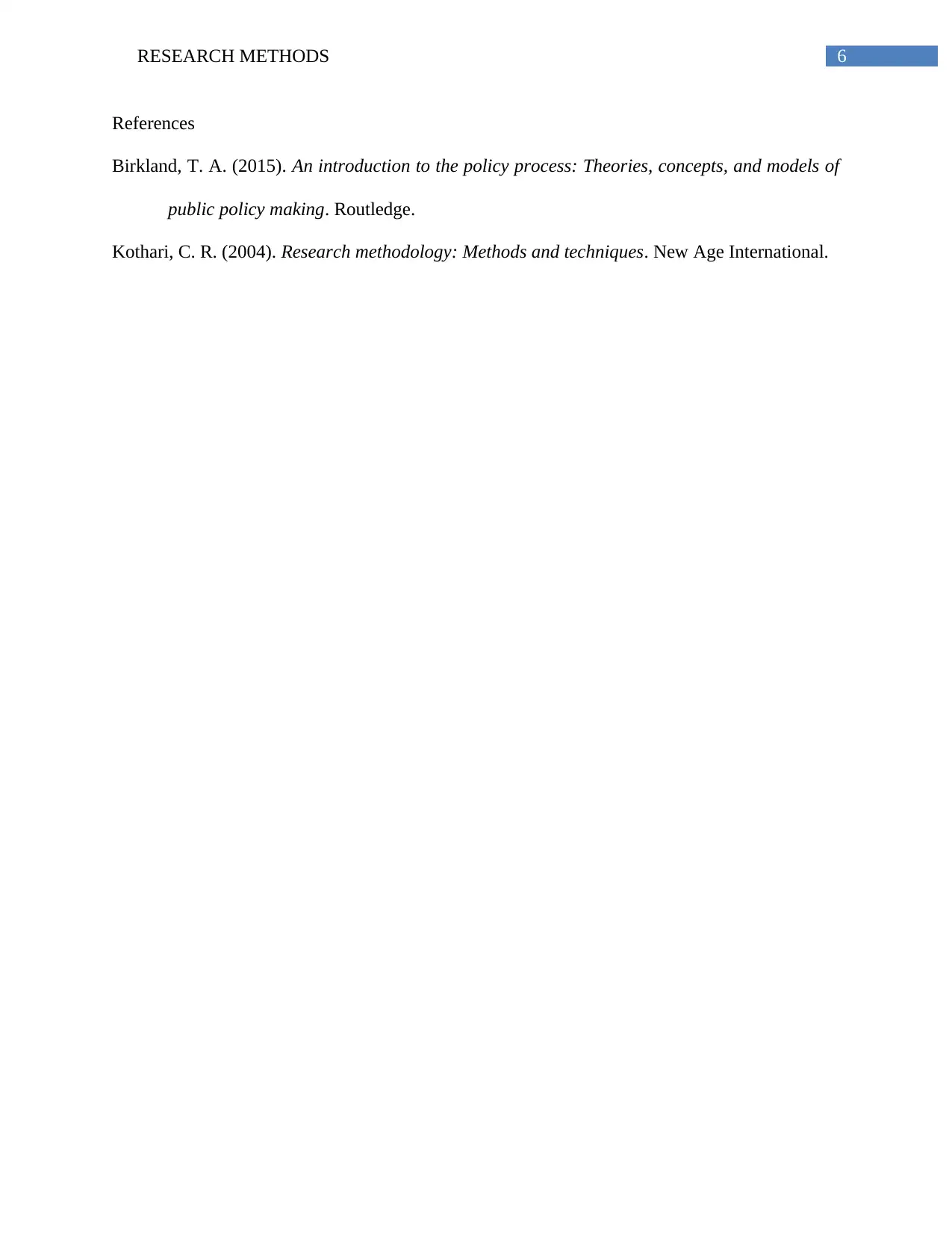
6RESEARCH METHODS
References
Birkland, T. A. (2015). An introduction to the policy process: Theories, concepts, and models of
public policy making. Routledge.
Kothari, C. R. (2004). Research methodology: Methods and techniques. New Age International.
References
Birkland, T. A. (2015). An introduction to the policy process: Theories, concepts, and models of
public policy making. Routledge.
Kothari, C. R. (2004). Research methodology: Methods and techniques. New Age International.
1 out of 7
Your All-in-One AI-Powered Toolkit for Academic Success.
+13062052269
info@desklib.com
Available 24*7 on WhatsApp / Email
![[object Object]](/_next/static/media/star-bottom.7253800d.svg)
Unlock your academic potential
Copyright © 2020–2026 A2Z Services. All Rights Reserved. Developed and managed by ZUCOL.


